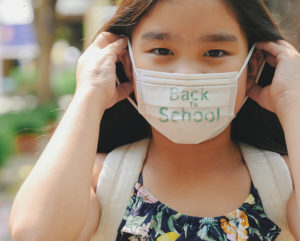Coping with and Recovering from the Pandemic: Key School Issues for Kids with ADHD
Matt Cohen JD
Attention Magazine August 2021
Download PDF
While it is now well recognized that kids with ADHD who struggle in school may be entitled to receive services under an IEP or a Section 504 plan, many students with ADHD continued to struggle prior to the pandemic, either despite these services or protections or because schools were still not willing or sufficiently trained to adequately evaluate and serve kids with ADHD. With the onslaught of the pandemic and the resulting need for schools to first shut down and then shift to remote learning, there has been great confusion about how remote learning will work (or whether it works), what the rights of all students are during the pandemic, and especially, how kids with disabilities can and must be served during this extraordinary time.
 Kids with disabilities are especially vulnerable generally, hence the need for special education services and accommodations to begin with. Kids with ADHD are particularly vulnerable to the impact of remote learning on their ability to function and engage productively in education. Specific challenges arising from a shift to remote learning for kids with ADHD include that they generally benefit from greater structure, which is difficult to provide during remote learning; they need more prompting and cuing; they have more difficulty with working autonomously; and they get easily distracted or bored if the instruction is not engaging or is difficult. As a result, many kids with ADHD have struggled, perhaps even more so than many other kids, during the period of remote learning.
Kids with disabilities are especially vulnerable generally, hence the need for special education services and accommodations to begin with. Kids with ADHD are particularly vulnerable to the impact of remote learning on their ability to function and engage productively in education. Specific challenges arising from a shift to remote learning for kids with ADHD include that they generally benefit from greater structure, which is difficult to provide during remote learning; they need more prompting and cuing; they have more difficulty with working autonomously; and they get easily distracted or bored if the instruction is not engaging or is difficult. As a result, many kids with ADHD have struggled, perhaps even more so than many other kids, during the period of remote learning.
This article will address things that can be done to assist kids who are still fully or partially attending school in a remote learning environment, ways to ease the transition back to live in-person instruction, and ways to seek extra help (compensatory education) from the schools for services that were lost during the period of remote instruction.
Strategies to assist kids still in remote learning who are struggling
It is important to know that despite schools shifting to remote instruction for most of the last year, the federal government has been clear that children’s IEPs remain in force and the special education IDEA rights remain unchanged and continue to be enforceable. However, the US Department of Education and the various state departments of education have made clear that due to the unique circumstances of the pandemic, remote learning plans generally may allow for a degree of flexibility in implementation that deviates from the specific provisions of the written IEP or 504 plans. Further, there is no national standard. Instead, specifics can be determined on a state-by-state basis to a considerable degree.
Importantly, it is crucial for schools to have considered any barriers to access and engagement that are apparent, such as lack of technology or Wi-Fi signals, or that the child has trouble attending to learning without supervision, or that the parent is not available to provide support. This information must be taken into account, and the school should attempt to address these barriers to allow the child’s remote learning to be successful. Sadly, for many children and families, this either didn’t occur or their feedback was ignored or their suggestions rejected.
If there are problems with the design or implementation of the remote learning plan or if the child is having problems, the parents should first document all the problems the child is having, what the school is or is not providing that they said they would, and their efforts to communicate with the school to get a solution. Then, the parents should inform the teacher or the IEP/504 team of the problems and seek help in addressing them. If the school staff are unwilling or unable to provide an informal solution or modification to the remote learning plan, the parents may request an IEP or 504 meeting to formally review the problems and seek solutions. If this occurs, parents should be careful to resist school attempts to simply reduce goals, expectations, or level of service in a revised IEP as a way to claim that they are implementing the plan.
Reducing goals or services in the IEP is not a solution to the plan not working. If both informal efforts and efforts at the IEP or 504 meeting level are unsuccessful, the parents should go up the administrative chain to the principal, special education director, or superintendent. If they are still unsuccessful, parents retain the right to request mediation or a due process hearing or file a state complaint for a special ed violation or an Office for Civil Rights complaint for a 504 violation. While this is better avoided if possible, it may be necessary if the parents are unable to resolve the dispute otherwise.
Preparing for partial or full return to in-person instruction
The return to school is going to be welcome for most, but challenging for all, both students and teachers, regular ed and special ed. Both parents and educators need to anticipate these difficulties and plan for a return that takes these problems into account. The parents should collect and share data and anecdotal information on the child’s functioning during remote learning with school team, in order to assure that the appropriate level of instruction and support is provided when regular school starts. A whole year of school has been partially or fully lost and the teachers will have little idea of where kids are at academically and functionally when everyone returns to school, so as much information about the child’s current progress or lack thereof can be very helpful.
 As parents think about the return to school, they should be prepared for the possibility or likelihood that the configuration of school will be different than it was pre-pandemic. It may include different hours of attendance, different groupings of students and/or teachers, new behavioral regulations regarding proximity and hygiene safety for health reasons. In some instances, the school district may even have changed the schools to which the students are assigned in order to better accommodate distance plans at school, requiring the student to attend a new school. Parents should do what they can to prepare the child for known and possibly unknown changes, and work with the school staff to reduce the stress and disruption accompanying the return.
As parents think about the return to school, they should be prepared for the possibility or likelihood that the configuration of school will be different than it was pre-pandemic. It may include different hours of attendance, different groupings of students and/or teachers, new behavioral regulations regarding proximity and hygiene safety for health reasons. In some instances, the school district may even have changed the schools to which the students are assigned in order to better accommodate distance plans at school, requiring the student to attend a new school. Parents should do what they can to prepare the child for known and possibly unknown changes, and work with the school staff to reduce the stress and disruption accompanying the return.
Particularly with younger students, parents and educators should treat the return to school as if the student was starting school for the first time. Seek to arrange visits to tour the building before school starts, arrange some type of orientation meeting between student and teachers before school starts, and seek preferred teachers and positive peers to increase the chances of successful transition. Parents and educators should also recognize and prepare students for the likelihood that the first few weeks (or more) of school may be chaotic. Teachers may be occupied with trying to figure out at what level students are, and work and rework groupings to meet the needs of students and teachers. Where helpful, provide visual schedules and organizers for the students to assist them in adjusting to the new patterns and keeping track of the new schedules and work.
Parents and educators should also account for the unusual and less structured environment that has existed for the last year. For most kids with ADHD, being at home is less structured, demanding and stressful than being at school. The adults should prepare the students for the change in structure and alert staff to concerns and strategies that may be useful and necessary to facilitate a smooth transition back. This could include sharing strategies the parents used to help maintain the structure or alternative types of structure, as well as seeking more regular initial communication and monitoring with school staff to address problems earlier (as they emerge) rather than reacting to problems later (when they become more serious).
As with the section above, if there are problems, staff must respond to them and parents retain all special education and 504 rights to address disagreements.
What about making up for what was lost during remote learning?
Remember that the schools had a continuing obligation to provide FAPE—free appropriate public education—during the period of remote learning, though they have flexibility in how to implement services in light of the pandemic. According to an important guidance from the US Department of Education at the start of the pandemic:
It is important to emphasize that federal disability law allows for flexibility in determining how to meet the individual needs of students with disabilities. The determination of how FAPE is to be provided may need to be different in this time of unprecedented national emergency. As mentioned above, FAPE may be provided consistent with the need to protect the health and safety of students with disabilities and those individuals providing special education and related services to students.*
However, the US DOE also said that if there is a delay or interruption of services, schools must consider whether compensatory education is warranted to make up for lost special education and related services:
Where, due to the global pandemic and resulting closures of schools, there has been an inevitable delay in providing services—or even making decisions about how to provide services—IEP teams (as noted in the March 12, 2020 guidance) must make an individualized determination whether and to what extent compensatory services may be needed when schools resume normal operations.**
As yet, there is no clear guidance from the federal government or the courts on how to decide whether compensatory education is warranted. Currently, the issue is in the hands of the individual states. This will be a source of considerable confusion and litigation in the next several years as there is disagreement about what the schools must do and what students with ADHD and other disabilities are entitled.
Although there is uncertainty, that should not prevent parents from making the request for compensatory services, especially when the loss was severe, where the school failed to respond to concerns raised by the parents that remote learning wasn’t working, and/or the child’s academic or behavioral functioning substantially regressed.
In making requests for compensatory services, parents should try to present data on where the child was functioning pre-pandemic, and where they are now, in order to demonstrate either stagnation or, worse, regression. Note that due to the lack of normal monitoring and documentation, many schools will not have adequate data on their end to show that the child is progressing appropriately, so parents’ information should get more weight than it might otherwise.
Students with ADHD and their parents, as is true for all kids with disabilities, have suffered greatly due to the pandemic and remote learning. Many of the attributes of ADHD make these kids especially vulnerable to the ways that remote learning was delivered and caused significant academic and mental health problems. Despite the flexibility that schools were allowed in implementing remote learning, many legal protections remain in force and the right to compensatory education remains available, although the extent of its enforcement remains to be tested. Parents are encouraged to reach out to their school teams to seek more help for their children, to collaborate and support the school staff, and to advocate for their kids when the school does not respond adequately. Where necessary, parents should consult knowledgeable advocates or attorneys to get help with their child’s situation.
 Matt Cohen, JD, is the senior attorney at Matt Cohen and Associates, a Chicago-based special education and disability rights law firm. He is the former president of CHADD and has presented and written widely on ADHD and special education topics. He can be contacted at mdcspedlaw@gmail.com.
Matt Cohen, JD, is the senior attorney at Matt Cohen and Associates, a Chicago-based special education and disability rights law firm. He is the former president of CHADD and has presented and written widely on ADHD and special education topics. He can be contacted at mdcspedlaw@gmail.com.
NOTES
* US Department of Education Supplemental Fact Sheet Addressing the Risk of COVID-19 in Preschool, Elementary and Secondary Schools While Serving Children with Disabilities, March 21, 2020 https://www2.ed.gov/about/offices/list/ocr/frontpage/faq/rr/policyguidance/Supple%20Fact%20Sheet%203.21.20%20FINAL.pdf
** Ibid.
Other Articles in this Edition
I-PCIT: When Help Is Needed Now
ADHD and Healthy Lifestyle Behavior
Coping with and Recovering from the Pandemic: Key School Issues for Kids with ADHD
Calling All Students, We Need You!
Tracking Homework Assignments: Why Students with ADHD Struggle
The Gender Myths
(Or “Only Boys Have ADHD”)
The Myth of ADHD Overdiagnosis
The Parent As If They Are Younger Myth
